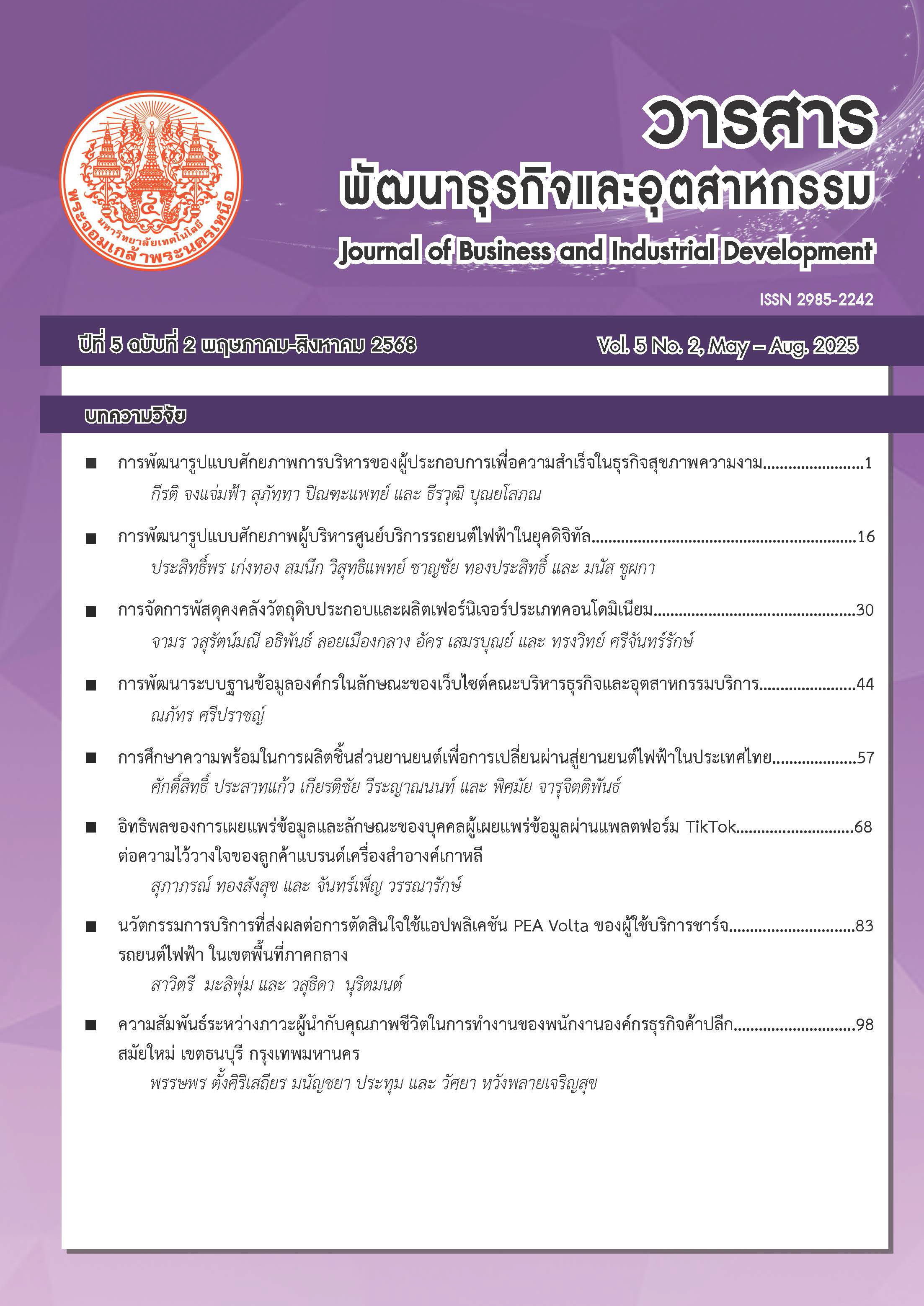Development a Potential Model for Electric Vehicle Service Center Executives in the Digital Age
Keywords:
Potential Development Model, Electric Vehicle Service Center Manager, Digital AgeAbstract
This research the objectives are to: 1) study the potential components of electric vehicle service center executives in the digital era; 2) develop a potential model for electric vehicle service center executives in the digital era; and 3) prepare a guideline for developing the potential of electric vehicle service center executives in the digital era. Use mixed research methods. With qualitative research and quantitative research, the group of information providers included: 1) a group of experts in in-depth interviews; and 2) 8 people, including electric car service center executives, experts, and academics in the electric car field. 2) a group of 15 experts in a focus group meeting, including electric car service center executives. and experts in the field of electric cars; and 3) the sample group of 187 people responding to the questionnaire, including executives of electric car service centers. The tools used in the research include interviews and questionnaires. Statistics used in data analysis include frequency, percentage, mean, and standard deviation. and exploratory component analysis using a ready-made statistical program. The results of the research found that the main components of the potential of electric vehicle service center executives in the digital era have three main components: 1. Knowledge (knowledge) has four secondary components: 1.1 Strategic management 1.2 Financial Management 1.3 Digital Technology in Electric Vehicles and 1.4 Human Resource Management 2. Skills have four secondary components: 2.1 Management in the digital age 2.2 Consumer behavior analysis 2.3 Digital and Communication Technology and 2.4 Foreign language and 3. Attributes. There are three secondary components: 3.1 Work Behavior, 3.2 Relationship Management, and 3.3 Self-Development. The results of the evaluation of the model came from a focus group meeting with 15 experts, who reached a unanimous decision. It is seen that the model for developing the potential of electric vehicle service center executives in the digital era is appropriate. and a guideline for developing the potential of electric car service center executives in the digital era. All five experts had consistent opinions. saw that the manual was appropriate and could be practically applied.
References
Soontronwipat, R., Wisuttipaet, S., & Boonyasopon, T. (2020). The Development of The Essential Competency Model for Manager in Next-Generation Automotive. Journal of Business and Industrial Development, 30(3), 547–555. (in Thai)
Silpcharu, T. (2020). Research and Statistical Data Analysis with SPSS and AMOS (9th ed.). Bangkok: SE-EDUCATION Public Company Limited. (in Thai)
Likert, R. (1993). A Technique for The Measurement of Attitude. Chicago: Rand McNally.
Cronbach, L. J. (1990). Essentials of Psychological Testing (5th ed.). New York: Harper Collins Publishers.
Dechatipachote, K., Yuphong, S., Ketsingha, W., & Poolkrajang, A. (2023). The Development of a Potential Model of Executives of The Small Food Manufacturing Factories to Increase Competitiveness. Journal of Liberal Art of Rajamangala University of Technology Suvarnabhumi, 5(1), 15–27. https://so03.tci-thaijo.org/index.php/art/article/view/265799 (in Thai)
Inthapichai, P. (2020). The Development of The Essential Competency Model for Safety Manager in Construction in The Railway Industry [Unpublished doctoral dissertation]. King Mongkut's University of Technology North Bangkok. (in Thai)
Komonwit, K. (2022). Competencies of Human Resources Executives in Hotel Business: Analysis Using Delphi Technique [Unpublished master’s thesis]. Silpakorn University. (in Thai)
Rakthanyakarn, C., Yuphong, S., Attavinijtrakarn, P., & Boonyasopon, T. (2022). The Development Model of Production Supervisor’s Potential in Smart Electronics Industries. Journal of Humanities and Social Sciences Nakhon Phanom University, 12(1), 16–30. https://so03.tci-thaijo.org/index.php/npuj/article/view/258343 (in Thai)
Peerawanichkul, U., Siengchin, S., Boonyasopon, T., & Wisuttipaet. S. (2022). The Development Model of Petrol Station Executives to Enhance Competitive Business in Digital Age. Journal of MCU Peace Studies, 10(4), 1809-1826. https://so03.tci-thaijo.org/index.php/journal-peace/article/view/247883 (in Thai)
Müller, R., & Turner, J. R. (2010). Attitudes and Leadership Competences for Project Success. Baltic Journal of Management, 5(3), 307–329. https://doi.org/10.1108/17465261011079730
Chatsanguthai, P. (2014). The Development Model of Potential Management to Work in ASEAN. Doctoral Dissertation [Unpublished doctoral dissertation]. King Mongkut's University of Technology North Bangkok. (in Thai)
Downloads
Published
How to Cite
Issue
Section
License
Copyright (c) 2025 Journal of Business and Industrial Development

This work is licensed under a Creative Commons Attribution-NonCommercial-NoDerivatives 4.0 International License.





